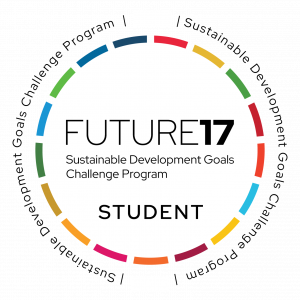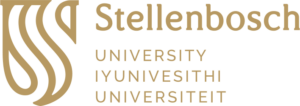Future17 Sustainable Development Goals Challenge

Future17 Sustainable Development Goals Challenge: September – December 2025
Do you have a heart for creating a visible impact in your community?
Are you searching for tools to help you realize a sustainable project?
Do you want to learn more about Sustainable Development and how you can be a part of it?
Learn about the key aspect of the UN’s SDGs (Sustainable Development Goals) in this innovative new Short Course.
Please join us as the SDG/2063 Impact Hub as we gear up to host the seventh Future17 Sustainable Development Goals (SDGs) Challenge Literacy programme at SU. Eligible students are invited to apply to participate in real-life challenges with an industry partner, using the SDGs as a framework, while staff are invited to apply as an academic mentor for the same offering in 2025.
Background to Challenge
The Future17 SDG Challenge Short Course, launched at SU in March 2022 offers a unique opportunity to take part in a new global sustainability education programme across disciplines and cultures set by the SDG Challenge Partners. It uses the UN’s SDGs as a framework to help find solutions for the global, interdisciplinary challenges we are facing, while building participants’ key employability, critical thinking and presentation skills. Participants will use collaborative and innovative ways to approach challenges, working with the partner universities and mentors assigned by the different institutions. You can read more about the UN’s Agenda 2030 and the SDGs here.
The Institutions: This prestigious short course is presented by the University of Exeter (UK), QS World University Rankings and a consortium of universities. Stellenbosch University as a founding member forms part of this consortium, alongside the Chinese University of Hong Kong, Auckland University (NZ), LUISS University in Rome (Italy) Arizona State University (USA) and The American University in Sharjah (UAE). More institutions will be announced shortly. The industry Challenge Partners include organisations like NGOs, institutions and companies that have conceptualised challenges. Challenges can range from creating a digital strategy to promote the SDGs to University students, doing market research for urban farms, to recycling soap from hotel chains to create jobs for communities


Information on previous cohorts
The first cohort of 40 Students and 11 mentors completed the first offering in early June 2022, followed by seven more offerings, the last one finishing in May 2025: If you would like to know more about the programme and hear from former students, you can read more about the students’ experiences in this news article.
Short Course Structure: This short course is part-time, as selected by the selection panel. The full cost of the course is subsidised by SU International where the Hub is located. The only cost to students, is for the certification and registration fee of R125. The course takes place in an online environment with international partner universities. With this short course (presented virtually), we hope to transform how students at SU are educated on Sustainable Development, as they prepare to become the leaders and policymakers of tomorrow, while understanding the intricacies of working in a global, multinational setting. Candidates that are accepted will learn and develop those skills needed to help solve real-world problems and sustainability challenges in a multi-cultural environment.
Eligibility: Undergraduate students from their 3rd year onwards, and all postgraduate students from Honours level in 2025 and up. Interested mentors should hold a PhD (or be about to finish) and have some teaching experience.
- Interested mentors and contact the SDG/2063 Impact Hub programme manager and academic lead for the Future17 Challenge directly: susdev@sun.ac.za
Participants can expect the following from the Challenge
- Promote skills for Design Thinking as a way of mobilising creative, visual, inter-personal, iterative and multi-configurational approaches to problem solving;
- Enable students to appreciate the importance of interdisciplinary, and inter-cultural exchange and learning for tackling sustainable development challenges;
- Develop students’ critical thinking skills to question conventional assumptions about sustainable development challenges through Design Thinking approaches;
- Develop employability skills by providing a space for students to work intensively with academic and SDG Challenge Partner mentors on a sustainable development challenge of mutual interest;
- Enable students to gain an appreciation of the sustainable development challenges facing SDG Challenge Partners and how these can be responded to appropriately;
- Develop skills for promoting change within organizational settings and developing systems and mechanisms to support such changes;
- Develop professional presentation and report writing skills for external organizations;
- Promote students’ awareness of and interest in applying academic knowledge to sustainable development challenges in a professional setting;
- Provide students with an opportunity to generate non-academic impact for tackling sustainable development challenges.
Short Course phases: The Future17 Challenge will progress according to the following phases with groups of 6-8 students from the various universities, you can expect to spend approximately 150 hours on the Short Course in total, including consultations with the company you are partnered with.
Phase 1: Starting 15 September 2025: Online program induction and skills for tackling sustainability challenges (self-paced learning over four weeks)
- Learn about design thinking, collaborative learning and teamwork, liaison with organisations and clients as well as intercultural exchange.
- You will need approximately 12 hours to complete this phase
- You will be assigned to your team and mentor during this phase and start getting to know each other.
Phase 2: Starting 13 October 2025: Group collaboration on a sustainability challenge (eight weeks plus one week for assessment preparation)
- Learn about your sustainability challenge and work with your team and mentor to develop solutions.
- You will primarily work on MS Teams as a meeting and document sharing platform.
- You will need approximately 16 hours for this phase.
Phase 3: Future17 Project presentations: 24 November 2025
- Student group presentations online (one hour, with Q&A) to showcase work to offer further collaborative learning.
- Submit a final written assignment one week after the event.
- You will need approximately 4 hours for this phase.
- We will host an online non-compulsory ‘graduation’ event in January 2026.
In addition to the hands-on time needed for the different phases as above, you might expect to spend another 90 hours on independent study and collaborating with your group to complete the project, presentation and final assignment.

Accreditation
You will be certified for this short course by QS University rankings on the successful completion of the project, as well as Stellenbosch University through our Short Course programmes. There will be both formative (group presentations on project progress) and summative (group presentation and written report).
For any queries: Please email the Programme Administrator on susdev@sun.ac.za. Student participants from their 3rd academic year postgraduate students are invited to apply for 2025 second semester offering. Applications close 1 August 2025. Preference will be given to postgraduate students should we have a large response.
Staff with PhDs and those in the final phases of their PhDs are invited to apply to be an Academic Mentor (here).
